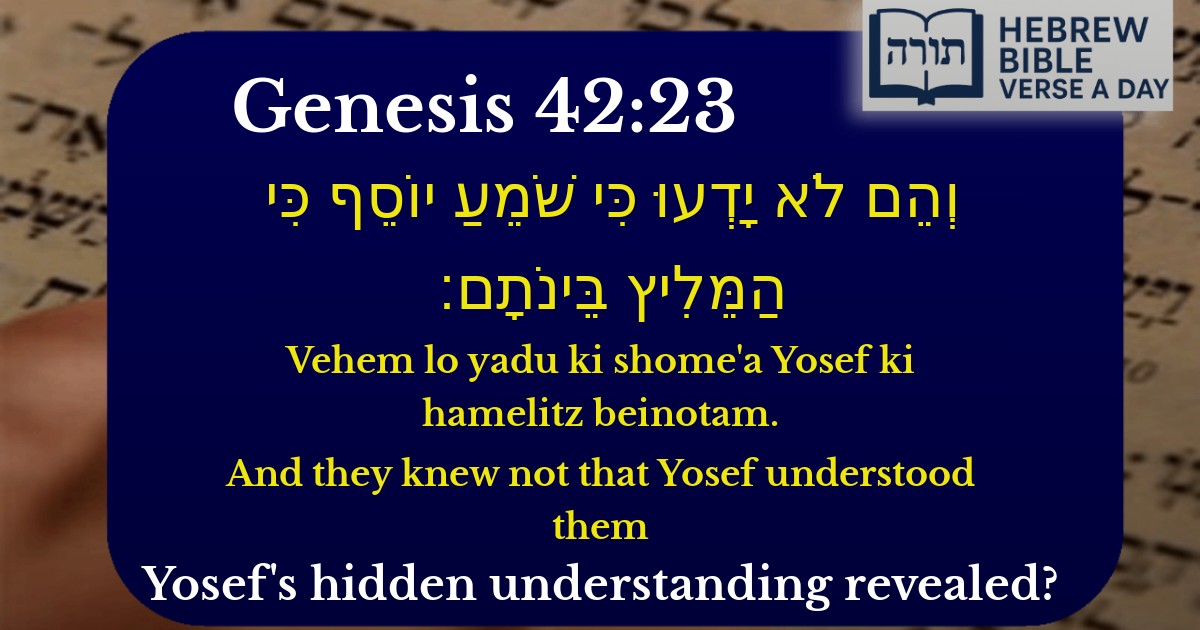Frequently Asked Questions
Q: Why didn't Yosef's brothers recognize him in Egypt?
A: According to Rashi (Genesis 42:8), Yosef's brothers didn't recognize him because he had left home as a beardless youth and now appeared as a mature, bearded Egyptian ruler. Additionally, the Midrash (Bereishit Rabbah 91:7) explains that they couldn't imagine their brother becoming a ruler in Egypt.
Q: Why does the Torah mention that Yosef understood his brothers' conversation?
A: The Torah emphasizes this point (Genesis 42:23) to show that Yosef heard his brothers expressing regret for selling him (Rashi on 42:21). This becomes important later when Yosef reveals himself, as it shows his brothers had undergone teshuvah (repentance).
Q: What lesson can we learn from Yosef understanding his brothers while they didn't know?
A: This teaches us about Divine Providence (hashgacha pratis) - that even when we don't realize it, Hashem is orchestrating events for our ultimate good. The Rambam (Hilchos Teshuvah) discusses how apparent difficulties can lead to redemption, as happened with Yosef and his brothers.
Q: Why was there an interpreter between Yosef and his brothers if Yosef understood Hebrew?
A: Rashi (Genesis 42:23) explains that Yosef maintained the pretense of being an Egyptian who didn't understand Hebrew, using an interpreter to conceal his identity. This was part of his plan to test whether his brothers had changed since selling him.
Q: How does this verse connect to the theme of hiddenness in the Yosef story?
A: This verse exemplifies the theme of 'hester panim' (hiddenness of Divine face) that runs through Yosef's story. Just as Yosef's identity was hidden from his brothers, sometimes Hashem's plan is hidden from us (Talmud Chagigah 5b). The story ultimately shows how hidden events lead to redemption.


The Ignorance of Yosef's Brothers
The verse states: "And they knew not that Yosef understood them, for the interpreter was between them" (Bereishit 42:23). This moment occurs when Yosef's brothers stand before him in Egypt, unaware of his true identity, while he listens to their private conversation.
Rashi's Explanation
Rashi comments that the phrase "for the interpreter was between them" explains why the brothers did not realize Yosef understood their words. Yosef spoke to them through an interpreter (מֵלִיץ), giving the impression that he did not know Hebrew. In reality, Yosef understood their language perfectly but concealed this knowledge to maintain his disguise.
Midrashic Insights
Rambam's Perspective on Hidden Knowledge
Rambam (Hilchot Teshuva 2:1) discusses how repentance requires full awareness of one's sins. Here, Yosef's hidden understanding allowed his brothers to speak freely, revealing their true feelings of guilt—a necessary step toward their eventual teshuvah (repentance) for their actions against him.
Chassidic Interpretation
The Sefat Emet teaches that Yosef's concealment of his identity parallels how Hashem sometimes hides His presence in our lives (הסתר פנים), yet remains intimately aware of our struggles. The brothers' lack of awareness serves as a lesson in recognizing that Hashem hears all, even when His involvement is not immediately apparent.